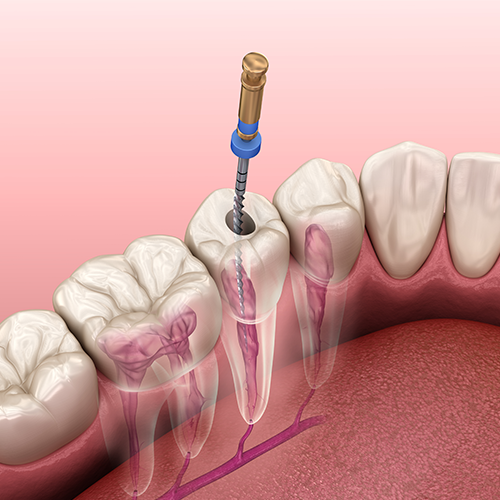
Root canal procedure is a term for endodontic treatment. Root canal procedure is important when the pulp(nerve) inside the tooth turns out to be irreversibly harmed or tainted. This irreversible harm is an aftereffect of consolidated wounds that happen over the existence of the tooth (decay, injury, various reclamations). Root treatment is the expulsion of the whole pulp all through the root trench framework (a tooth can have a few roots and a channel or two inside those roots), the cleaning and molding of the trench framework, and filling the canals with a polyester manufactured root canal filling and a dental sealer.
The most important benefit of root canal procedure is that you keep your tooth.
Assuming that you have any circumstances as expressed beneath, you could require a root trench treatment:
Dull hurt or serious torment, sensitivity to hot or cold foods and drinks, problem with biting, uneasiness that awakens you around evening time, having analyzed result for endodontic treatment either by clinical test or xray.
Know not all teeth that are needing root canal treatment will cause pain.
During Root Canal 
Dental specialist will analyze the x-ray and the tooth. Then, local anesthetics are adminşstered by dentist. After the tooth is desensitized, a little defensive sheet, called a dental elastic dam is put to confine the tooth. An initial will be made in the crown of the tooth and little instruments will be utilized to clean. When the canals have been cleaned and molded, the canals will be loaded up with a polyester engineered root canal filling and sealer. A filling is then positioned to close the opening. Your dental specialist will eliminate the transitory filling before the tooth is reestablished.
With modern techniques and varied local anesthetic solutions it is rare to feel any pain during in treatment. For the first few days after treatment, your tooth may be sensitive to biting. This discomfort can hela with prescription medications that recommended by your dentist.
After Procedure
The most recognized indicator of post-treatment sensitivity is pre-treatment pain. the tooth is now harming the root canal technique will eliminate the reason and permit recuperating to start. During the initial 3-4 days we will recommend a pain relieving routine that ought to permit you to start recuperating pain free. In most cases, any sensitivity to cold, hot or even breathing air will be gone after your visit. the discomfort will relax within the first 24-48 hours. You may experience mild discomfort to pressure that could last for several days after procedure. It is recommended to take over-the-counter anti-inflammatory analgesics such as ibuprofen ,naproxen or aspirin relax this discomfort
The most widely recognized complaint is delicacy to contact,biting, tapping on the tooth. It is generally best to bite on the opposite side until a super durable rebuilding replaces the impermanent restoration and healing.

 Average length of stay
Average length of stay Length of stay in hospital
Length of stay in hospital Operation duration
Operation duration Anesthesia
Anesthesia Recovery Duration
Recovery Duration




